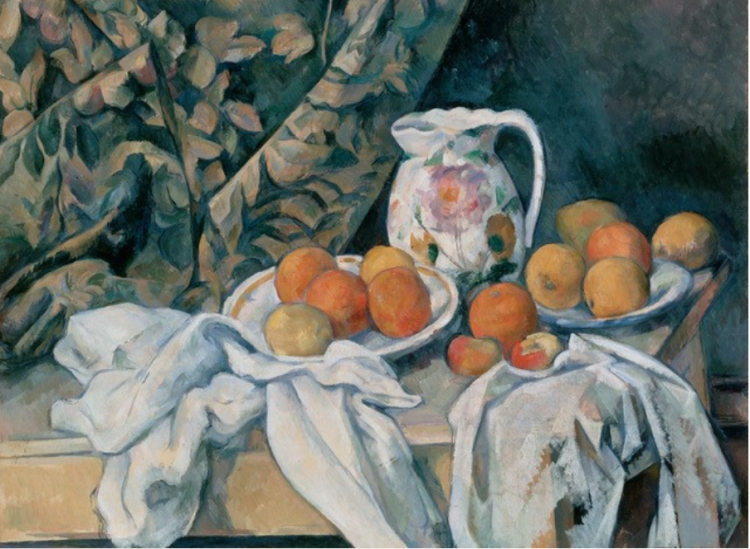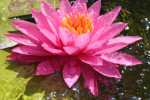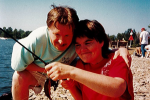Still-life paintings call to consciousness the stark beauty of what we too often see least, if at all: an old tapestry, a splash of fruit, a once strong barn, perhaps, now sunk into ruin, its glory and gain forgotten, its presence overlooked.
At first glance, then, still-life paintings do not seem to have much to say to anyone. The subjects they use, in most part, arouse no pathos, provide little in the way of human insight, touch the eye more than the heart. But not this one. Not Cézanne’s Still Life with Fruit and Curtain. This one strikes at the core of life. It requires us to ask ourselves what it is that nourishes us. And why.
I, for one, know how easy it is to get caught up in the dramatic and miss the power of the mundane, the wisdom of the daily, the comfort of regularity, the unexciting exciting dimensions of what it means to be really alive. And yet my life cries out for more and more and more of it always.
One week at the desk, one week with the community, one week of the quiet commonplace, one week—uninterrupted—soothes my soul beyond any telling of it. The daily schedule nourishes me, the sight of the familiar nourishes me, the silence nourishes me. The banter of friends and the rhythm of prayer, the best of music and the single shaft of promise every new day brings, provide the kind of balm no boughten balm can give.
The question of the painting begs for attention, then: What am I overlooking in life? What nourishes me? Am I doing enough to provide it? What happens to me when I don’t?
Whatever the answer to all those things, one thing grows increasingly more obvious as the years pass: every one of us, whoever we are, in this highly frenetic, jangling technological world in which we live—I certainly—need more of what nourishes us and less of what drains us.
Wednesday, March 1: We live in a culture so glutted by a multiplicity of people and things that it is almost impossible to appreciate the power of singularity. But, in the end, it is only the singular that has any real effect on us at all. It is in our commitment to the awareness of the singular that we are either nourished or starved of soul.
Thursday, March 2: What we concentrate on, the way we spend our time, tells us what we really care about. The whole question is a simple one: How do we spend our time and is that time well-spent where the soul is concerned?
Friday, March 3: For the most part, modern society is shaped by work rather than by relationships or personal interests. But with that comes the stress and the worry. Shakespeare’s advice has been totally forgotten: “Frame your mind to mirth and merriment,” he says, “which bars a thousand harms and lengthens life.” Not a bad idea in a world where the work never ends and the worry that comes with it never goes away.
Saturday, March 4: There are two ages in life that understand what a gift it is to sit and let the juice of a peach run down your chin. The first is preschool and the second is retirement. It’s the in-between years when the soul goes dry.
Sunday, March 5: When we can’t remember how long it’s been since we simply sat and looked at something we love, it’s been too many months...years...
Monday, March 6: There is a relationship between good cooking and a good life. Good cooking nourishes relationships, yes, but more than that it nourishes our very zest for all the possibilities of life. “When we no longer have good cooking in the world,” Marie-Antoine Carême writes, “we will have no literature, nor high and sharp intelligence, nor friendly gatherings, nor social harmony.”
Tuesday, March 7: Every human act is an act of nourishment for someone. For others as well as for the self. To plant a tree is to nourish the future. To play good music is to nourish the arts. To read a good book is to nourish the soul.
Wednesday, March 8: What we nourish within us determines what we will become. Prayerful or not. Patient or not. Loving or not. “Nourish beginnings,” Muriel Rukeyser writes. “Let us nourish beginnings. Not all things are blest, but the seeds of all things are blest. The blessing is in the seed.”
Thursday, March 9: Never take anything for granted—the people you associate with, the things you choose to do in your free time, the television programs you watch. Everything touches us, shapes us, nourishes the thoughts we think. All of them are making us more or less of what we are meant to be.
Friday, March 10: It’s what we take into ourselves that we then communicate to others in some form or other. Maybe that’s what we see in the faces of the holy ones. What glows so brightly in them is the serenity and kindness they have nourished within themselves all their lives.
Saturday, March 11: Let life in and you will find more and more of yourself coming fully alive.
Sunday, March 12: We are all born grasping for something and spend the rest of our lives doing the same. What we become depends on what we grasp for every minute of the day. “The pure taste of the apple,” Simone Weil writes, “is as much a contact with the beauty of the universe as the contemplation of a picture by Cézanne.”
Monday, March 13: We go through life like robots on an assembly line. Learning to live consciously, to see what we see and to hear what we hear, coaxes the soul into the fullness of its humanity.
Tuesday, March 14: When you’re sad and mad, depressed and deprived, disappointed and lonely, what nourishes your heart: good tea, fine music, the presence of a friend, a long walk in the rain? Whatever it is, you and you alone can make it happen. And if you don’t, you doom yourself to the darkness within.
Wednesday, March 15: Spiritual nourishment is anything that fills us with a sense of the fundamental goodness of life, the clear and constant gifting of God.
Thursday, March 16: It is almost impossible to be spiritually nourished in the midst of shapeless, meaningless, soul-searing noise. “True silence,” William Penn wrote, “is the rest of the mind, and is to the spirit what sleep is to the body, nourishment and refreshment.”
Friday, March 17: To fail to fill ourselves with good things is to abandon ourselves to useless ones that dry out the center of us and leave us thirsting for the life we were given to cultivate but did not.
Saturday, March 18: No amount of things—no amount of money, no amount of cars or baubles or parties or houses or trips—can substitute for being full of life inside ourselves. “Not what we have,” Jean Antoine Petit-Senn wrote, “but what we enjoy, constitutes our abundance.”
Sunday, March 19: Good food, fun food, food served in candlelight or served in the sun—served with a bit of laughter and a great deal of barely disguised affection, carries us from one chapter in life to another. Carries us beyond past hurts. Carries us over life’s doubts. Carries us into whole new segments of life. Life without good food is life without a safety net. “After a good dinner,” Oscar Wilde wrote, “one can forgive anybody, even one’s own relations.”
Monday, March 20: We have become a culture obsessed with eating. Correction: we are now obsessed with not eating. Which may well be why we can’t stop thinking about food. As a result, now struggling with the obsession, we eat more than we should and then fear to eat the very things that would nourish our friendships, our memories, our energies for the rest of life. Good wine, a mother’s comfort food, and a bite of chocolate on a tiring day become the enemies of our life. How sad.
Tuesday, March 21: Food is the thread of life: We eat at funerals, we eat at weddings, we eat at graduation parties, we eat on holidays. When we are pensive or hurting or lonely or thinking, we begin to look for “comfort food,” simple foods that give more warmth to the heart than nourishment for the body. “If you are cold, tea will warm you,” William Gladstone said. “If you are heated, it will cool you. If you are depressed, it will cheer you. If you are excited, it will calm you.”
Wednesday, March 22: Food is the ultimate act of hospitality. It says, I am here to support you, sustain you, share life with you and help you. “The teapot is on,” someone wrote, “the cups are waiting/Favorite chairs anticipating/No matter what I have to do/My friend, there’s always time for you.” Food is what enables us to open ourselves—unguarded and unboundaried—in ways no other act of life can possibly do.
Thursday, March 23: Nourishment is the medicine of the home. Long before alternative medicines or nutritionists, Hippocrates wrote, “If we could give every individual the right amount of nourishment and exercise, not too little and not too much, we would have found the safest way to health.”
Friday, March 24: When we fail to realize that food is only half the nourishment we need as human beings, we become less a human being than we are meant to be. “Hearts starve as well as bodies,” James Oppenheim wrote in a poem honoring women textile strikers. “Give us bread, but give us roses.”
Saturday, March 25: We concentrate a lot on providing food for ourselves. But the real question is, How much do we concentrate on providing art for the heart, music for the soul, literature for the mind? “A person should hear a little music, read a little poetry, and see a fine picture every day of life,” Johann Wolfgang von Goethe wrote, “in order that worldly cares may not obliterate the sense of the beautiful which God has implanted in the human soul.”
Sunday, March 26: Dress up at least once a week. Beauty—our own—nourishes a sense of presence in us that overflows into the arenas of life and makes them more beautiful for others, as well.
Monday, March 27: All the food in the world cannot substitute for the nourishment of the rest of us, the part of us that makes life both livable and human. “Without art, without beauty,” Valentin Okorokov wrote, “our life would be poor, dull and unemotional, and it could bring about erosion of the human soul.”
Tuesday, March 28: Sight is meant to nourish us, so what do we look at? Hearing is meant to nourish us, so what do we listen to? Unless we seed the soul with beauty, we cannot possibly live beautiful lives. “All poetry and music, and art of every true sort,” J. B. Phillips wrote, “bears witness to our continual falling in love with beauty and our desperate attempt to induce beauty to live with us and enrich our common life.”
Wednesday, March 29: To be unaware of the soulful in life is to starve the soul. “If you foolishly ignore beauty,” the architect Frank Lloyd Wright wrote, “you will soon find yourself without it. Your life will be impoverished.”
Thursday, March 30: The longer we live, the more beautiful life becomes. First, we try to control our lives and fail. Then, finally we abandon ourselves to what life gives us and discover how rich we really are.
Friday, March 31: In the end, what I concentrate on in life will be the measure of the life I live. In the end, it will be beauty, art and the little things of life that nourish us to the end. “Many’s the long night,” Robert Louis Stevenson wrote, “I dreamed of cheese—toasted, mostly.” Point: It’s the little things that make life beautiful. Always the little things.
LET’S SHARE OUR THOUGHTS
The following discussion questions, Scripture echoes, journal prompts, and prayer are meant to help you reflect more deeply on The Monastic Way. Choose at least two suggestions and respond to them. You may do it as a personal practice or gather a group interested in sharing the spiritual journey.
1. Sister Joan lists many things that can nourish our lives and the lives of others: beauty, music, art, delicious food, silence, reading a good book, planting a tree, friends… Where do you go for nourishment, for that which makes your life both livable and human? Is there any area that you’d like to explore more? Explain.
2. Which daily quote in The Monastic Way is most meaningful to you? Why? Do you agree with it? Disagree? Did it inspire you? Challenge you? Raise questions for you?
3. After reading The Monastic Way write one question that you would like to ask the author about this month’s topic.
4. Joan Chittister uses other literature to reinforce and expand her writing. Find another quote, poem, story, song, art piece, novel that echoes the theme of this month’s Monastic Way.
5. A spiritual master was on his deathbed and his closest disciple decided to bring him his favorite pastry treat before the master died. The disciple went to the village and returned with a little cake that the master accepted with a weak but broad smile. As he slowly nibbled on the little cake, his other disciples crowded around his bed and pleaded, “Master, do you have any departing words?” Wiping a crumb from his lips he replied, “Ah, yes!” As the disciples quickly gathered closer around his bed, he said, “My, but this cake is delicious.”
Would you say the spiritual master had learned the secret of a life well lived? Why or why not?
SCRIPTURE ECHO
“God has made everything beautiful in its time; moreover… I know that there is nothing better for people than to be happy and enjoy themselves as long as they live. Moreover, it is God’s gift that all should eat and drink and take pleasure in all their toil.” Ecclesiastes 3:11-13
What is your reaction when you see people who are happy and are able to take pleasure in their lives and even their work? Are you able to share in their joy? Is it difficult for you to see contentment and pleasure as part of holy people’s lives?
JOURNAL PROMPTS
Prompt 1. Here are a few statements from this month’s Monastic Way. Choose one that is most helpful to you and journal with it.
•The longer we live, the more beautiful life becomes.
•Give us bread, but give us roses.—James Oppenheim
•it’s the little things that make life beautiful. Always the little things.
Prompt 2. Spend a few minutes with this photograph and journal about its relationship to this month’s Monastic Way. You can do that with prose or a poem or a song or….
PRAYER
I should like a great lake of finest ale
for the King of kings.
I should like a table of the choicest food
for the family of heaven.
Let the ale be made from the fruits of faith
and the food be forgiving love.
I should welcome the poor to my feast,
for they are God’s children.
I should welcome the sick to my feast,
for they are God’s joy.
Let the poor sit with Jesus at the highest place,
and the sick dance with the angels.
God bless the poor,
God bless the sick,
and bless our human race.
God bless our food,
God bless our drink;
all homes, O God, embrace.
—Brigid of Kildare Abbey

 Artwork: Still Life with Fruit and Curtain by Paul Cezanne
Artwork: Still Life with Fruit and Curtain by Paul Cezanne




